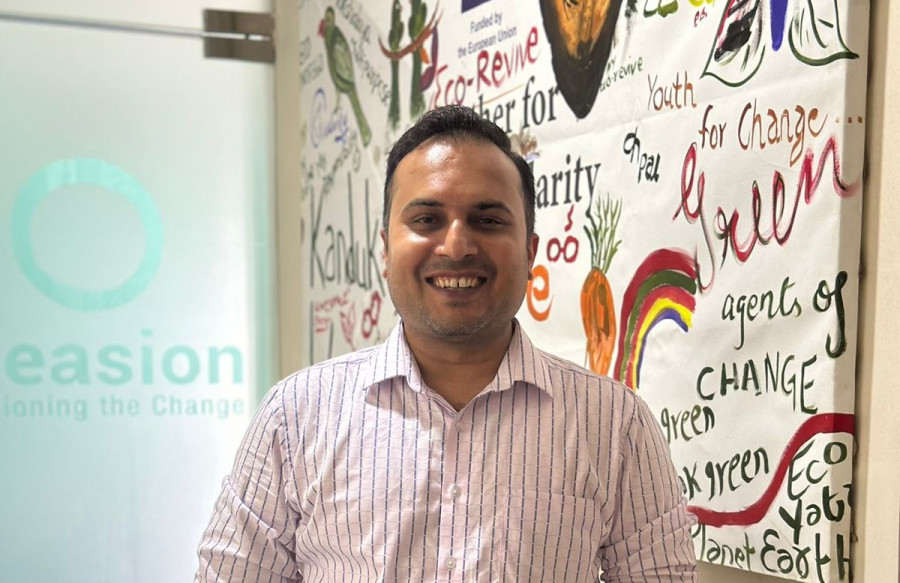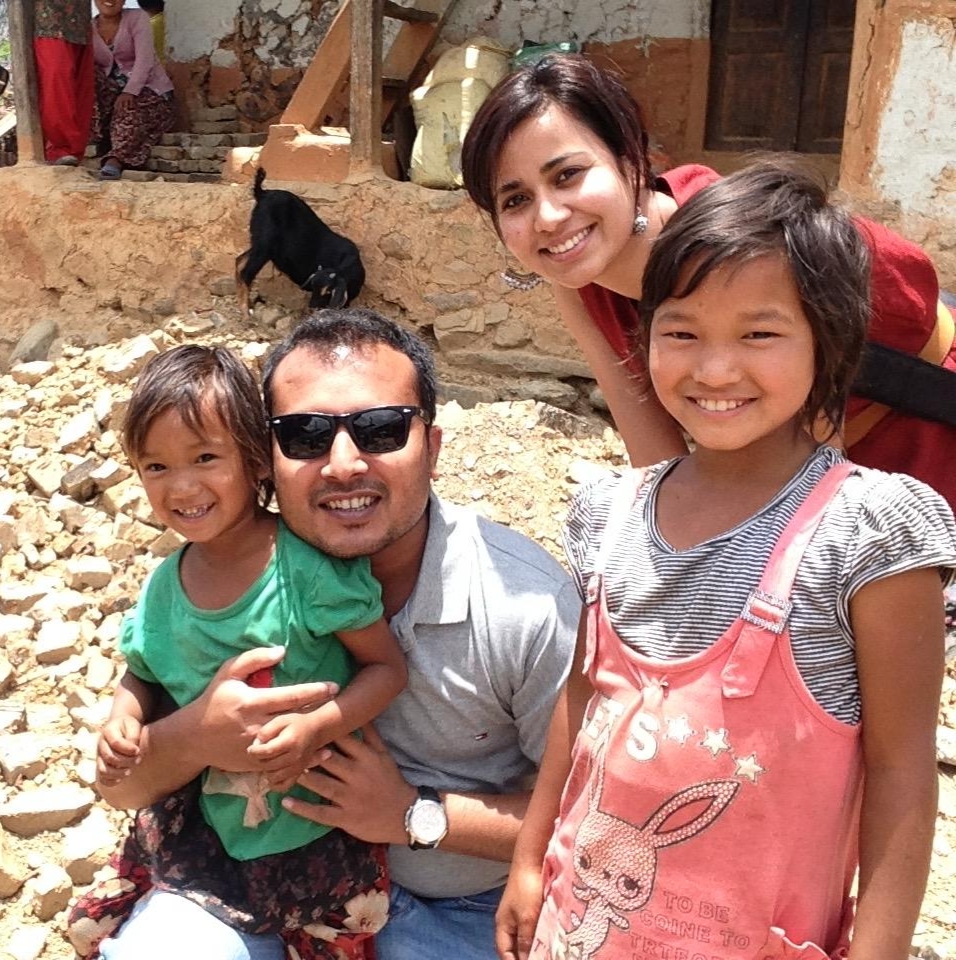Culture & Lifestyle
Redefining development
Aanand Mishra has been a development professional, social entrepreneur and an activist for over 20 years.
Aarati Ray
Aanand Mishra, the founder and president of the non-profit organisation Creasion (Center for Research and Sustainable Development Nepal), is a development professional, social entrepreneur, and activist with over 20 years of experience in the field. Creasion focuses on environmental protection through recycling, research, emergency response, grassroots initiatives, and circular economy projects.
On a typical day, you might see Mishra in his office—friendly and calm, working with his team and offering guidance. He could also be found at climate-smart workshops, working with and mentoring young participants. Watching him interact with his team, it's evident that he strongly believes in the power of teamwork.
This conviction began when he was around eight years old as he watched his grandfather, a grassroot activist.
As a child, Mishra would hold his grandfather's warm, calloused fingers with his hands and often accompany him to community work and workshops in their village, Tilathi, Saptari.
During a time when village life was marked by strict caste segregation between so-called ‘upper and lower castes’, Mishra's grandfather, from a Brahmin family, broke these social barriers. He would sit with Dalits, eat with them, build wells for them, and work for the welfare of marginalised people, who were regarded as untouchables by the society. His grandfather believed in forming small teams to help people, convinced that teamwork made overcoming difficulties easier—a belief that Mishra also embraced.
Watching his grandfather work for community welfare always made Mishra happy. “Although I couldn’t understand it fully, I subconsciously promised to do something similar like Nana (maternal grandfather in Maithili) when I grow up,” Mishra recalls. Since then, he has been dedicated to fulfilling that promise.
Around sixth grade, he started a small club with 20 students. They each contributed five rupees to start a reading club, which began with comic books and eventually became a library in 1998.
In seventh grade, he had the chance to participate in a national UNICEF event in Kathmandu.
By eighth grade, on January 1, 2000, UNICEF appointed him as the national president of the child club ‘Baal Chetana Samuha’, the first club in Nepal for minors. As president, he worked for children's rights. “That's when my official journey in the social and developmental field began,” he says.
Mishra used to travel regularly between Kathmandu and his village for his work. His mother insisted that he move to Kathmandu for higher education. He agreed and came to Kathmandu in 2004 to pursue a Bachelor’s degree in Development Studies.
Coming from a small village and a simple school, Mishra struggled to adapt to Kathmandu’s advanced education system and lifestyle. His first two years of bachelor's were particularly tough. As a Madheshi with Maithili as his mother tongue, he struggled with Nepali and faced discrimination.
“The pain of being an outsider stayed with me.” Motivated by this experience, he discussed his ideas with a few close friends and started Creasion in 2005.
“My goal was simple: to ensure that all youths and students coming to Kathmandu, regardless of their background or district, would have equal opportunities for volunteering, internships, exposure, and a platform to pursue their dreams,” Mishra recalls.
In response to the 2015 earthquake, he launched a program called Rebuild for Change (RFC). Through RFC, they built 1,000 houses, established one climate-smart village, and constructed ten schools. This effort included 55 cement houses in Lele, Burunchuli village, which was the first climate-smart village they created, and 945 temporary metal site (TMS) houses in the worst-affected areas.
Until then, Mishra concentrated on addressing immediate issues and challenges. However, around 2017, individuals from the Coca-Cola Foundation proposed that he continue his work on plastic-related projects, similar to what he had done in 2013. Acknowledging the global significance of plastic waste, Mishra and his team conducted research for two years.

In 2019, with support from the Coca-Cola Foundation, they launched the Material Recovery Facility (MRF) project in Chitwan and initiated waste-smart schools in various parts of the region.
He also started Recycler Saathi, a project to promote recycling. “I thought we could all be friends in developing the habit of recycling and together solving the problem,” Mishra explains. The project was successful, recycling around 5,000 metric tons of plastic.
According to Mishra, the main issue in plastic and waste management in Nepal is the absence of a coherent policy. The government has delegated waste management duties to local municipalities, but they lack sufficient knowledge, training, or resources. Numerous municipalities lack landfill sites and management expertise, and there's no clear division of responsibilities between provincial and local governments.
“The central government believes their role is complete once they assign responsibilities, but that's insufficient. There needs to be excellent coordination among all three levels of government. A comprehensive report and study on plastic management, usage, import, and recycling are crucial,” he suggests.
Mishra believes that good plastic should be used appropriately, bad plastic should be minimised, and very harmful plastics, such as multilayered packaging, should be phased out. He emphasises the importance of private businesses joining efforts to address this urgent issue but points out that many prioritise profit, risking the well-being of future generations.
Mishra, a supporter of sustainable development, also feels that Nepal is behind in this area because development is frequently associated with destruction and lacks thorough research. Another challenge is that Nepal is turning into an ‘airport’, with many people focused on leaving. “We need to transform Nepal from an airport into a nurturing home where change can occur. I am optimistic that this transformation can happen,” he says.
“Around 2004 and 2005, I faced subtle yet continuous discrimination for being a Madheshi. Even today, I occasionally experience it. When people learn my surname and see my face, they often categorise me as an Indian,” Mishra remembers.
Mishra views this discrimination as a global problem, where dominant groups often marginalised minorities. Instead of letting it affect him, he focuses on uplifting marginalised groups through his work.
“In the future, my goal, together with my team, is to reduce plastic pollution and integrate plastic recycling into the circular economy,” Mishra says. His dream is to achieve complete circularity in the recycling industry and create job opportunities that support Nepal's economy.
Mishra also dreams of recognising the skilled young professionals in Nepal who choose to stay and contribute to the country. "We often complain about youths leaving the country. But what about those who stay? Have we provided them with enough resources and opportunities for growth? Have we thanked them, honoured them, or even given them a pat on the back? We haven't, and this is crucial. I work with dedicated young individuals and will continue to seek more opportunities for them," he adds.
He advises young people to support themselves if possible. “See the world by standing on your own feet. You don't need to travel the globe to gain perspective; sincerely exploring your own roots, village, or country is enough.”




 9.89°C Kathmandu
9.89°C Kathmandu

.jpg&w=200&height=120)













